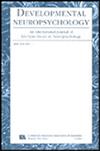阅读障碍学童的面部加工:神经心理学和眼动追踪研究结果。
IF 2.2
4区 心理学
Q3 PSYCHOLOGY
Developmental Neuropsychology
Pub Date : 2022-03-01
Epub Date: 2022-02-11
DOI:10.1080/87565641.2022.2034828
引用次数: 4
摘要
阅读障碍是一种影响阅读的神经发育困难,但最近的成人数据表明,这种困难也延伸到面部处理。在这里,我们用眼球追踪和神经心理学测试测试了有和没有阅读障碍的在校儿童的面部处理。患有阅读障碍的儿童在面部凝视模式、面部记忆或面部识别准确性方面与对照组没有显著差异。然而,他们的速度更慢,异质性更强,组内方差比对照组更大。在对照组中,对眼睛的注视模式增加与更好的面部记忆有关。我们讨论了经验因素在先前研究中联系阅读障碍和面部加工差异的可能作用。本文章由计算机程序翻译,如有差异,请以英文原文为准。
Face Processing in School Children with Dyslexia: Neuropsychological and Eye-tracking Findings.
Dyslexia is a neurodevelopmental difficulty affecting reading, but recent data in adults suggest that difficulties also extend to face processing. Here, we tested face processing in school children with and without dyslexia, using eye-tracking and neuropsychological tests. Children with dyslexia didn't differ significantly from controls in face gaze patterns, face memory, or face identification accuracy. However, they were slower and more heterogeneous, with larger within-group variance than controls. Increased gaze patterns toward the eyes were associated with better face memory in controls. We discuss the possible role of experiential factors in prior research linking dyslexia and face processing differences.
求助全文
通过发布文献求助,成功后即可免费获取论文全文。
去求助
来源期刊
CiteScore
2.80
自引率
6.70%
发文量
17
审稿时长
>12 weeks
期刊介绍:
Devoted to exploring relationships between brain and behavior across the life span, Developmental Neuropsychology publishes scholarly papers on the appearance and development of behavioral functions, such as language, perception, and social, motivational and cognitive processes as they relate to brain functions and structures. Appropriate subjects include studies of changes in cognitive function—brain structure relationships across a time period, early cognitive behaviors in normal and brain-damaged children, plasticity and recovery of function after early brain damage, the development of complex cognitive and motor skills, and specific and nonspecific disturbances, such as learning disabilities, mental retardation, schizophrenia, stuttering, and developmental aphasia. In the gerontologic areas, relevant subjects include neuropsychological analyses of normal age-related changes in brain and behavioral functions, such as sensory, motor, cognitive, and adaptive abilities; studies of age-related diseases of the nervous system; and recovery of function in later life.
Empirical studies, research reviews, case reports, critical commentaries, and book reviews are featured in each issue. By publishing both basic and clinical studies of the developing and aging brain, the journal encourages additional scholarly work that advances understanding of the field of lifespan developmental neuropsychology.

 求助内容:
求助内容: 应助结果提醒方式:
应助结果提醒方式:


